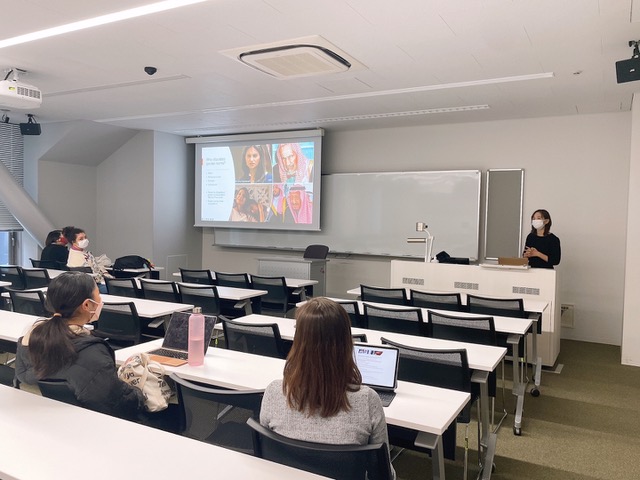授業紹介:CONTEMPORARY SOCIETIES OF THE MIDDLE EAST
教員からのコメント Comment of Professor
Women in the Middle East are often portrayed as voiceless victim who should be saved. But such an assumption oversimplifies the lives of women. This course will provide a basic overview of modern history of women in the Middle East, including how they were portrayed by the Orientalist in the early modern period, and how women from the Middle East resisted to such portrayals. In the meantime, we closely look at the rise and development of women's movements in various countries in the region, which of course includes failures and disappearance. The course aims at obtaining holistic understanding on the gender and women in the Middle East.
中東地域の女性はしばしば声のない犠牲者であり、救済されるべき存在とみなされてきました。けれども、このような一面的な捉え方では、女性の多様な生を理解することはできません。この講義では、近代以降の中東地域の女性史を解説します。講義では、中東地域のフェミニズムの誕生と展開に重点を置いて考察しますが、もちろんフェミニズム運動のなかには失敗したものや霧消したものもあります。中東地域の複数の国の事例を取り上げることで、中東地域の女性とジェンダー問題を総合的に理解することを目指します。

学生からの声 class interview
This course explores the history of women and feminist movements in the Middle East, unpacks orientalist representations of Middle Eastern women, and fosters nuanced understandings of women’s lived experiences in countries ranging from Tunisia to Israel. The course consists of on-demand lecture videos, reaction papers, and occasional in-person classes where we discuss a short film depicting the lives of people living in Middle Eastern societies. The reason that I decided to take class can trace back to my first year when I took another class of Prof. Tsujigami on the history of feminist movements throughout the world and the concept of intersectionality. It was an eye-opening class that deepened my interest in gender issues. To learn more about how women in different Middle Eastern societies experience and navigate gender inequalities based on their varying socioeconomic contexts I decided to take another class by Prof. Tsujigami. I also wanted to learn more about the influences of Western colonial and orientalist thought in shaping the widely held images of Arab women as ‘voiceless’ or ‘powerless’ victims needing to be saved from their religion and culture. Through this class, I have also learned how the problem of gender inequality in Middle Eastern societies is far more complex than it seems and applying intersectional lenses could be helpful in deepening our understanding of the issue.
One of the unique aspects about this class is that we can watch short films based in Middle Eastern societies, as well as the time to openly discuss the films together. There are many valuable points that can be discovered and gained from watching films. For instance, these allow us to enter into the worlds of the characters and to experience what it might be like to live in their social, political, and economic contexts — something that cannot be as effectively expressed through lectures or readings. Through the class discussions that follow the films, we are able to further expand our perspectives. Not only has this course deepened my understanding of the history of feminist movements and gender-based struggles in the Middle East, but it has also been a good opportunity for me to take a deeper look within myself and to notice the assumptions or preconceptions I might have towards women living in Middle Eastern societies. I hope this will help me to approach discussions and debates surrounding gender issues in the Middle East from a broader perspective, as well as help me to build bridges with women from these cultures in the years ahead.
(Mana Short, 3rd year, Faculty of Global Studies)
この授業は中東における女性とフェミニスト運動の歴史を探求し、中東における女性のオリエンタリズム的な表現を解き放ち、チュニジアからイスラエルに至るまで、女性の人生経験についてのきめ細やかに理解を深めます。中東の人々の生活を描いた短編映画をテーマに講義映像、リアクションペーパー、テストで構成されています。この授業を履修しようと思った理由は私が1年生の時履修した辻上先生の世界のフェミニスト歴史と交差性の概念についての授業を通じてこのサブジェクトについてもっと学びたくなったからです。そしてこの1年生の授業を通じてジェンダー問題への関心が深まりました。私はまた辻上先生の授業を受講して、中東社会の女性がどのように色々な社会経済的状況に基づいてジェンダーの不平等を経験し、乗り越えているかについてさらに学びました。また、宗教や文化から救われる必要のある「無声」または「無力」な犠牲者としてのアラブ女性のイメージが広く形成されていることについて、西洋の植民地主義と東洋思想の影響についてもっと知りたいと思っていました。辻上先生の授業で学んだように、中東社会におけるジェンダー不平等の問題ははるかに複雑であり、理解を深めるためには交差レンズを適用する必要があります。この授業の魅力は中東社会に基づいた短編映画を見る機会があることと、その映画について一緒に率直に話し合う時間があることです。映画を見ることで発見し、得られる貴重なものはたくさんあります。たとえば、登場人物の世界に入り込み、彼らの社会的、政治的、経済的文脈の中で生活することがどのようなものかを体験することができます。これは、講義や朗読では効果的に表現できないものです。映画をフォローする討論で、私たちはさらに視野を広げることができました。この授業は、中東におけるフェミニスト運動とジェンダーに基づく闘争の歴史についての理解を深めただけでなく、自分自身をより深く見て、自分が中東社会に住む女性に対して持っているかもしれない思い込みや先入観に気づく良い機会にもなりました。これが、中東のジェンダー問題を取り巻く議論や討論に、より広い視点からアプローチするのに役立つことを願っています。
(総合グローバル学部 3年生 Mana Short)
This class looks at gender, sexuality, and ethnicity/race in the Middle East in an agentive and critical manner. I took this class because I wanted to challenge my preconceptions about the Middle East and the women living there. I was most interested in its focus on the voices of Middle Eastern women rather than constantly victimizing them. I would like to have had this class in-person or in a hybrid format to discuss it with fellow students and the professor more.
(2nd year, Faculty of Global Studies)
この授業では、中東のジェンダー、セクシュアリティ、民族性/人種を批判的な見方で検討しています。中東とそこに住む女性についての私の先入観に挑みたかったから、この科目を履修しました。この授業では、中東の女性を常に犠牲にするのではなく、彼女らの声に焦点を当てていることに最も興味を持ちました。今後このクラスを対面または対面・オンライン組み合せの方式で実施することで、他の学生や教授とより議論ができると思いました。
(総合グローバル学部 2年生)
